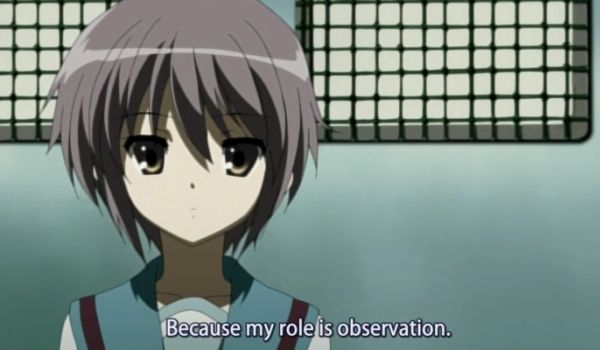“Because my role is observation.” (Yuki Nagato, from an anime about Haruhi Suzumiya.)
I am still in the middle of reading Butterflies are free to fly (parental, grandparental, angelic and divine guidance recommended, as this book may well cause insanity, suicide or lifelong unhappiness in the fragile or not exceptionally sturdy and well-prepared reader.)
The book quotes Jed McKenna, a probably fictional teacher of extreme truth-seeking. This is actually kind of true: “Ultimately, the only spiritual practice is observation; seeing things the way they really are.” Whether it is the only, I don’t know, but I have found it to be essential. That is why I used to call myself a “conscientious observer” for a long time. (It is a pun on “conscientious objector”, obviously, but I did not pick it only for its fun value.)
In light of this, it is puzzling that Mr Butterfly … Stephen Davis, I mean, is pretty much rejecting meditation as a kind of distraction that seeks to induce an altered state of consciousness. I am not sure what kind of meditation he has done, but he presumably has done some, being the new-age person he was. But something must have gone wrong. You see, meditation should make you MORE aware, not less. If you’re tuning out, if you’re entering the land of fuzzy, you’re doing it wrong. Sure, meditation should cause you to relax. Your body, that is. Your awareness however should increase.
There are actually two aspects of this. One is the very slow increase in your capacity to be aware or conscious, a process that takes years. A more immediate effect is the surge of available awareness when you sit down and detach from the self-generated busyness of daily life.
Usually we spend our time either doing something that requires attention, or thinking of something that has happened or will happen or ought to happen or should have happened or may happen if, but perhaps not if, and it was their fault and not mine. This is the standard human condition. When we sit down and shut up, the awareness is withdrawn from these habits, and there is a surge of free awareness. When we are new and lack technique and discipline, it is common for this free awareness to latch onto random things nearby: Either sights or sounds, feelings in our body, emotions in our mind, memories or internal images. More likely than not, the surge of awareness will magnify these so they become awe-inspiring, or deliriously pleasant, or terrifying, or otherwise larger than life. Thus we have an Experience.
The Meditation Experience is pretty much unavoidable, and sellers of related materials (such as brainwave entrainment programs) do their best to create positive expectations, which will (if all goes reasonably well) assure that you get a Good Trip instead of a Bad Trip during your first sessions.
In reality, the Experience is a side effect, and actually a distraction. What we want to become able to do is observe ourselves. We want to be able to watch our thoughts as we think them, our feelings as we feel them, without having to stop what we are doing and ponder. Usually we are almost completely absorbed in whatever we are doing, and are seeing completely through our eyes. We are not at the same time seeing ourselves from outside.
The purpose of the observation is not to evaluate, to judge. I mean, sure we can do that, but it is highly likely that this will distract us and we end up with a courtroom case with ourselves trying to defend ourselves against ourselves, and I cannot imagine how much awareness one must have to keep track of that AND the actual life we are performing the living of, at the same time.
Sure, we should judge ourselves. But before we do that, we must observe ourselves. The purpose of meditation is not to feel good, although stressed people usually feel good when their bodies relax. (Then fall asleep, which is pretty much the opposite of meditation. But if you lack sleep, and almost all modern people do, it will soon become a habit to fall asleep when you try to meditate. This is the reason for the unnatural and even painful positions of many meditation schools. A better alternative, I think, is to actually set aside more time for sleep.)
People who have been meditating deeply, frequently and regularly for a couple decades or more, may begin to become aware at all times, including during dream and finally dreamless sleep. They achieve a state of constant witnessing.
I am not saying you cannot achieve that by writing down truth, as the more or less fictional Jed McKenna proposes. Perhaps meditation is a relic from before paper became commonly available. But it works, if you do it right, or even reasonably right. You become more and more aware of yourself, without losing the ability to actually live your life while you observe it. At first you have to take time out from your life to observe yourself, but eventually you can be said to “meditate” all the time, to some degree.
I don’t actually do that, not all the time. Occasionally I am swallowed up by something I do. And I am still unconscious while sleeping, after all these years, with a few seemingly random exceptions.
But the idea of meditation is not to increase fuzziness, but to reduce the bzzness of thoughts and plans and daydreams that repeat endlessly in the head, absorbing all available awareness. Bzz! Bzz! Busy bee thoughts fly round and round in the head. Withdraw from these. Because your role is to observe, first and foremost. Well, unless you’re an ordinary human or something, I guess.

